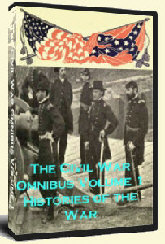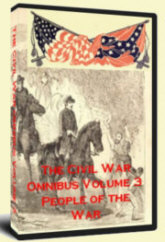The use of “colored troops” during the Civil War was a controversial practice that was debated by both the Union Army and the Confederate Army. Although African-American soldiers existed in the Confederate Army, they were few and far between, but in the Union Army, African-Americans accounted for ten percent of the soldiers who served in the Federal Army.
Around 180,000 African-Americans in 163 units served in the Union Army, and a significant amount of African-Americans served in the Federal Navy. Although many of the African-American soldiers and sailors were freedmen, a large number were also slaves who joined the cause either as runaways, or after being “seized” as contraband, a practice that was standard during the first years of the war.
However, it wasn’t until 1862 that Congress signed off on the use of African-Americans in the U.S. Army and Navy, passing two acts that allowed for the enlistment of African-Americans. While these acts were passed in April, they did not take effect until later in the year, after the Emancipation Proclamation. Read the rest of this entry »
Comments Off on African-American Troops and the Civil War
Next to Longstreet and Jackson, I consider A.P. Hill the best commander with me. He fights his troops well and takes good care of them. Robert E. Lee
While Confederate General A.P Hill was a household name during the Civil War, he is little known nowadays, despite the fact that he was considered among the most important of the Confederacy’s military officers during his time. Valued by both General Robert E. Lee and General Thomas “Stonewall” Jackson, A.P. Hill’s death just before the war’s conclusion was one of the final death blows dealt to the Confederacy.
Ambrose Powell Hill, known as “Little Powell,” was born in Virginia in 1825. A graduate of the United States Military Academy (15th in a class of 38), the slightly-built Hill was appointed after graduation to the U.S. Artillery as a second lieutenant, and went on to serve in both the Mexican-American War and the Seminole War, eventually being promoted to first lieutenant. He married Kitty Morgan McClung, a widow, in 1850, and found among his in-laws future brothers in arms John Hunt Morgan and Basil W. Duke. Read the rest of this entry »
Comments Off on A.P. Hill – Confederate Civil War Commander
Although they are not widely known, the vivandieres and cantinieres who traveled with regiments during the Civil War were women who, despite the constrictions of Victorian society, chose to serve alongside men during wartime in a role that American women thus far had not played. A part of their regiment, these women served several functions, all unheard of for American women of the time.
The history of the vivandiere, or cantiniere, is rooted in the Napoleonic War. During this war, it was not uncommon for bands of women, often the wives or daughters of members of the regiment, to “follow the drum” just behind a regiment. The French army, wishing to reduce the number of women who followed these regiments, restricted this activity, but as a compromise, allowed a few women to serve in some capacity in the regiment. These women became either as vivandieres or cantinieres. The duties of each were prescribed; vivandieres acted as a concessionaire of sorts, selling food and drink to the troops, remaining in camp, while cantinieres followed the regiments on campaign, also distributing food and drink, and nursing ill or wounded soldiers. Read the rest of this entry »
Comments Off on Vivandieres and Cantinieres – Ladies of the Regiment
During the Civil War, thousands of former slaves joined with the U.S. Army as they were liberated from the homes and plantations where they were enslaved. Although many of these freed men and women would be relocated, there were men among them who joined the Army, and women among them who chose to continue traveling with the Army, giving aid to the soldiers who fought to ensure their freedom.
One of these former slaves was Susie King Taylor, a black woman whose uncommon education made her valuable on many fronts to the U.S. Army, and the only black woman to publish her memoirs of her time with the Army during the Civil War.
Born a slave in Liberty County, Georgia, Susie was allowed by her master to go to Savannah, to live with her grandmother, when she was around seven years old. In Savannah, Susie had the good fortune to be able to attend covert schools for African-Americans at a time when Georgia had and enforced strict laws against the education of African-Americans. Susie was also assisted in her studies by two white youths who taught her, despite knowing that they were in violation of the law. Read the rest of this entry »
Comments Off on Susie King Taylor
The privilege of the writ of habeas corpus shall not be suspended, unless when in cases of rebellion or invasion, the public safety may require it. U.S. Constitution, Article One, Section Nine
The right of a prisoner to know the charges upon which he has been imprisoned is one of the basic rights granted by the U.S. Constitution. Known as habeas corpus, this right is both intrinsic to the justice system of the United States and important to ensuring freedom and liberty, rights which are also guaranteed to U.S. citizens.
During the Civil War, U.S. President Abraham Lincoln suspended habeas corpus, allowing suspected Confederate sympathizers to be imprisoned without knowing the cause – usually because there was no reason for their imprisonment other than their Confederate sympathies. Using the “unless when in cases of rebellion or invasion” clause to the right of habeas corpus, Lincoln exercised his executive authority to imprison those whom he felt were a threat to the Union. Read the rest of this entry »
Comments Off on The Suspension of Habeas Corpus During the Civil War


